По всем вопросам обращайтесь на: info@litportal.ru
(©) 2003-2024.
✖
Massacres of the South (1551-1815)
Настройки чтения
Размер шрифта
Высота строк
Поля
“‘Wherever luck takes us. Let us start.’
“She was going to put on her bonnet, but I told her to leave it behind; for it was most important that no one should think we suspected anything, but were merely going for a stroll. This precaution saved us, for we learned the next day that if our intention to fly had been suspected we should have been stopped.
“We walked at random, while behind us we heard musket shots from every part of the town. We met a company of soldiers who were hurrying to the relief of their comrades, but heard later that they had not been allowed to pass the gate.
“We recollected an old officer of our acquaintance who had quitted the service and withdrawn from the world some years before, and had taken a place in the country near the village of Saint-Just; we directed our course towards his house.
“‘Captain,’ said I to him, ‘they are murdering each other in the town, we are pursued and without asylum, so we come to you.’ ‘That’s right, my children,’ said he; ‘come in and welcome. I have never meddled with political affairs, and no one can have anything against me. No one will think of looking for you here.’
“The captain had friends in the town, who, one after another, reached his house, and brought us news of all that went on during that dreadful day. Many soldiers had been killed, and the Mamelukes had been annihilated. A negress who had been in the service of these unfortunates had been taken on the quay. ‘Cry “Long live the king!’ shouted the mob. ‘No,’ she replied. ‘To Napoleon I owe my daily bread; long live Napoleon!’ A bayonet-thrust in the abdomen was the answer. ‘Villains!’ said she, covering the wound with her hand to keep back the protruding entrails. ‘Long live Napoleon!’ A push sent her into the water; she sank, but rose again to the surface, and waving her hand, she cried for the last time, ‘Long live Napoleon!’ a bullet shot putting an end to her life.
“Several of the townspeople had met with shocking deaths. For instance, M. Angles, a neighbour of mine, an old man and no inconsiderable scholar, having unfortunately, when at the palace some days before, given utterance before witnesses to the sentiment that Napoleon was a great man, learned that for this crime he was about to be arrested. Yielding to the prayers of his family, he disguised himself, and, getting into a waggon, set off to seek safety in the country. He was, however, recognised and brought a prisoner to the place du Chapitre, where, after being buffeted about and insulted for an hour by the populace, he was at last murdered.
“It may easily be imagined that although no one came to disturb us we did not sleep much that night. The ladies rested on sofas or in arm-chairs without undressing, while our host, M______ and myself took turns in guarding the door, gun in hand.
“As soon as it was light we consulted what course we should take: I was of the opinion that we ought to try to reach Aix by unfrequented paths; having friends there, we should be able to procure a carriage and get to Nimes, where my family lived. But my wife did not agree with me. ‘I must go back to town for our things,’ said she; ‘we have no clothes but those on our backs. Let us send to the village to ask if Marseilles is quieter to-day than yesterday.’ So we sent off a messenger.
“The news he brought back was favourable; order was completely restored. I could not quite believe this, and still refused to let my wife return to the town unless I accompanied her. But in that everyone was against me: my presence would give rise to dangers which without me had no existence. Where were the miscreants cowardly enough to murder a woman of eighteen who belonged to no-party and had never injured anyone? As for me, my opinions were well known. Moreover, my mother-in-law offered to accompany her daughter, and both joined in persuading me that there was no danger. At last I was forced to consent, but only on one condition.
“‘I cannot say,’ I observed, ‘whether there is any foundation for the reassuring tidings we have heard, but of one thing you may be sure: it is now seven o’clock in the morning, you can get to Marseilles in an hour, pack your trunks in another hour, and return in a third; let us allow one hour more for unforeseen delays. If you are not back by eleven o’clock, I shall believe something has happened, and take steps accordingly.’ ‘Very well,’ said my wife; ‘if I am not back by then, you may think me dead, and do whatever you think best.’ And so she and her mother left me.
“An hour later, quite different news came to hand. Fugitives, seeking like ourselves safety in the country, told us that the rioting, far from ceasing, had increased; the streets were encumbered with corpses, and two people had been murdered with unheard-of cruelty.
“An old man named Bessieres, who had led a simple and blameless life, and whose only crime was that he had served under the Usurper, anticipating that under existing circumstances this would be regarded as a capital crime, made his will, which was afterwards found among his papers. It began with the following words:
“‘As it is possible that during this revolution I may meet my death, as a partisan of Napoleon, although I have never loved him, I give and bequeath, etc., etc.
“The day before, his brother-in-law, knowing he had private enemies, had come to the house and spent the night trying to induce him to flee, but all in vain. But the next morning, his house being attacked, he yielded, and tried to escape by the back door. He was stopped by some of the National Guard, and placed himself under their protection.
“They took him to the Cours St. Louis, where, being hustled by the crowd and very ineffectually defended by the Guards, he tried to enter the Cafe Mercantier, but the door was shut in his face. Being broken by fatigue, breathless, and covered with dust and sweat, he threw himself on one of the benches placed against the wall, outside the house. Here he was wounded by a musket bullet, but not killed. At the sight of his blood shrieks of joy were heard, and then a young man with a pistol in each hand forced his way through the throng and killed the old man by two shots fired point blank in his face.
“Another still more atrocious murder took place in the course of the same morning. A father and son, bound back to back, were delivered over to the tender mercies of the mob. Stoned and beaten and covered with each other’s blood, for two long hours their death-agony endured, and all the while those who could not get near enough to strike were dancing round them.
“Our time passed listening to such stories; suddenly I saw a friend running towards the house. I went to meet him. He was so pale that I hardly dared to question him. He came from the city, and had been at my house to see what had become of me. There was no one in it, but across the door lay two corpses wrapped in a blood-stained sheet which he had not dared to lift.
“At these terrible words nothing could hold me back. I set off for Marseilles. M______ who would not consent to let me return alone, accompanied me. In passing through the village of Saint-Just we encountered a crowd of armed peasants in the main street who appeared to belong to the free companies. Although this circumstance was rather alarming, it would have been dangerous to turn back, so we continued our way as if we were not in the least uneasy. They examined our bearing and our dress narrowly, and then exchanged some sentences in a low, voice, of which we only caught the word austaniers. This was the name by which the Bonapartists were called by the peasants, and means ‘eaters of chestnuts,’ this article of food being brought from Corsica to France. However, we were not molested in any way, for as we were going towards the city they did not think we could be fugitives. A hundred yards beyond the village we came up with a crowd of peasants, who were, like us, on the way to Marseilles. It was plain to see that they had just been pillaging some country house, for they were laden with rich stuffs, chandeliers and jewels. It proved to be that of M. R____, inspector of reviews. Several carried muskets. I pointed out to my companion a stain of blood on the trousers of one of the men, who began to laugh when he saw what we were looking at. Two hundred yards outside the city I met a woman who had formerly been a servant in my house. She was very much astonished to see me, and said, ‘Go away at once; the massacre is horrible, much worse than yesterday.’
“‘But my wife,’ I cried, ‘do you know anything about her?’
“‘No, sir,’ she replied; ‘I was going to knock at the door, but some people asked me in a threatening manner if I could tell them where the friend of that rascal Brine was, as they were going to take away his appetite for bread. So take my advice,’ she continued, ‘and go back to where you came from.’
“This advice was the last I could make up my mind to follow, so we went on, but found a strong guard at the gate, and saw that it would be impossible to get through without being recognised. At the same time, the cries and the reports of firearms from within were coming nearer; it would therefore have been to court certain death to advance, so we retraced our steps. In passing again through the village of Saint-Just we met once more our armed peasants. But this time they burst out into threats on seeing us, shouting, ‘Let us kill them! Let us kill them!’ Instead of running away, we approached them, assuring them that we were Royalists. Our coolness was so convincing that we got through safe and sound.
“On getting back to the captain’s I threw myself on the sofa, quite overcome by the thought that only that morning my wife had been beside me under my protection, and that I had let her go back to the town to a cruel and inevitable death. I felt as if my heart would break, and nothing that our host and my friend could say gave me the slightest comfort. I was like a madman, unconscious of everything round me.
“M______ went out to try to pick up some news, but in an instant we heard him running back, and he dashed into the room, calling out:
“‘They are coming! There they are!’
“‘Who are coming?’ we asked.
“‘The assassins!’
“My first feeling, I confess, was one of joy. I pounced upon a pair of double-barrelled pistols, resolved not to let myself be slaughtered like a sheep. Through the window I could see some men climbing over the wall and getting down into the garden. We had just sufficient time to escape by a back staircase which led to a door, through which we passed, shutting it behind us. We found ourselves on a road, at the other side of which was a vineyard. We crossed the road and crept under the vines, which completely concealed us.
“As we learned later, the captain’s house had been denounced as a Bonapartist nest, and the assassins had hoped to take it by surprise; and, indeed, if they had come a little sooner we had been lost, for before we had been five minutes in our hiding-place the murderers rushed out on the road, looking for us in every direction, without the slightest suspicion that we were not six yards distant. Though they did not see us I could see them, and I held my pistols ready cocked, quite determined to kill the first who came near. However, in a short time they went away.
“As soon as they were out of hearing we began to consider our situation and weigh our chances. There was no use in going back to the captain’s, for he was no longer there, having also succeeded in getting away. If we were to wander about the country we should be recognised as fugitives, and the fate that awaited us as such was at that moment brought home to us, for a few yards away we suddenly heard the shrieks of a man who was being murdered. They were the first cries of agony I had ever heard, and for a few moments, I confess, I was frozen with terror. But soon a violent reaction took place within me, and I felt that it would be better to march straight to meet peril than to await its coming, and although I knew the danger of trying to go through Saint-Just again, I resolved to risk it, and to get to Marseilles at all costs. So, turning to M____, I said:
“‘You can remain here without danger until the evening, but I am going to Marseilles at once; for I cannot endure this uncertainty any longer. If I find Saint-Just clear, I shall come back and rejoin you, but if not I shall get away as best I can alone.’
“Knowing the danger that we were running, and how little chance there was that we should ever see each other again, he held out his hand to me, but I threw myself into his arms and gave him a last embrace.
“I started at once: when I reached Saint-Just I found the freebooters still there; so I walked up to them, trolling a melody, but one of them seized me by the collar and two others took aim at me with their muskets.
“If ever in my life I shouted ‘Long live the king!’ with less enthusiasm than the cry deserves, it was then: to assume a rollicking air, to laugh with cool carelessness when there is nothing between you and death but the more or less strong pressure of a highwayman’s finger on the trigger of a musket, is no easy task; but all this I accomplished, and once more got through the village with a whole skin indeed, but with the unalterable resolution to blow my brains out rather than again try such an experiment.
“Having now a village behind me which I had vowed never to re-enter, and there being no road available by which I could hope to get round Marseilles, the only course open to me was to make my way into the city. At that moment this was a thing of difficulty, for many small bodies of troops, wearing the white cockade, infested the approaches. I soon perceived that the danger of getting in was as great as ever, so I determined to walk up and down till night, hoping the darkness would come to my aid; but one of the patrols soon gave me to understand that my prowling about had aroused suspicion, and ordered me either to go on to the city, in which by all accounts there was small chance of safety for me, or back to the village; where certain death awaited me. A happy inspiration flashed across my mind, I would get some refreshment, and seeing an inn near by, I went in and ordered a mug of beer, sitting down near the window, faintly hoping that before the necessity for a final decision arrived, someone who knew me would pass by. After waiting half an hour, I did indeed see an acquaintance – no other than M______, whom I had left in the vineyard. I beckoned him, and he joined me. He told me that, being too impatient to await my return, he had soon made up his mind to follow me, and by joining a band of pillagers was lucky enough to get safely through Saint-Just. We consulted together as to what we had better do next, and having applied to our host, found he could supply us with a trusty messenger, who would carry the news of our whereabouts to my brother-in-law. After an anxious wait of three hours, we saw him coming. I was about to run out to meet him, but M____ held me back, pointing out the danger of such a step; so we sat still our eyes fixed on the approaching figure. But when my brother-in-law reached the inn, I could restrain my impatience no longer, but rushing out of the room met him on the stairs.
“‘My wife?’ I cried. ‘Have you seen my wife?’
“‘She is at my house,’ was the reply, and with a cry of joy I threw myself into his arms.
“My wife, who had been threatened, insulted, and roughly treated because of my opinions, had indeed found safety at my brother-in-law’s.
“Night was coming on. My brother-in-law, who wore the uniform of the National Guard, which was at that moment a safeguard, took us each by an arm, and we passed the barrier without anyone asking us who we were. Choosing quiet streets, we reached his house unmolested; but in fact the whole city was quiet, for the carnage was practically at an end.
“My wife safe! this thought filled my heart with joy almost too great to bear.
“Her adventures were the following:
“My wife and her mother had gone to our house, as agreed upon, to pack our trunks. As they left their rooms, having accomplished their task, they found the landlady waiting on the staircase, who at once overwhelmed my wife with a torrent of abuse.
“The husband, who until then had known nothing of their tenant’s return, hearing the noise, came out of his room, and, seizing his wife by the arm, pulled her in and shut the door. She, however, rushed to the window, and just as my wife and her mother reached the street, shouted to a free band who were on guard across the way, ‘Fire! they are Bonapartists!’ Fortunately the men, more merciful than the woman, seeing two ladies quite alone, did not hinder their passage, and as just then my brother-in-law came by, whose opinions were well known and whose uniform was respected, he was allowed to take them under his protection and conduct them to his house in safety.
“A young man, employed at the Prefecture, who had called at my house the day before, I having promised to help him in editing the Journal des Bouches-du-Rhone, was not so lucky. His occupation and his visit to me laid him under suspicion of possessing dangerous opinions, and his friends urged him to fly; but it was too late. He was attacked at the corner of the rue de Noailles, and fell wounded by a stab from a dagger. Happily, however, he ultimately recovered.
“The whole day was passed in the commission of deeds still more bloody than those of the day before; the sewers ran blood, and every hundred yards a dead body was to be met. But this sight, instead of satiating the thirst for blood of the assassins, only seemed to awaken a general feeling of gaiety. In the evening the streets resounded with song and roundelay, and for many a year to come that which we looked back on as ‘the day of the massacre’ lived in the memory of the Royalists as ‘the day of the farce.’
“As we felt we could not live any longer in the midst of such scenes, even though, as far as we were concerned, all danger was over, we set out for Nimes that same evening, having been offered the use of a carriage.
“Nothing worthy of note happened on the road to Orgon, which we reached next day; but the isolated detachments of troops which we passed from time to time reminded us that the tranquillity was nowhere perfect. As we neared the town we saw three men going about arm in arm; this friendliness seemed strange to us after our recent experiences, for one of them wore a white cockade, the second a tricolour, and the third none at all, and yet they went about on the most brotherly terms, each awaiting under a different banner the outcome of events. Their wisdom impressed me much, and feeling I had nothing to fear from such philosophers, I went up to them and questioned them, and they explained their hopes to me with the greatest innocence, and above all, their firm determination to belong to what ever party got the upper hand. As we drove into Orgon we saw at a glance that the whole town was simmering with excitement. Everybody’s face expressed anxiety. A man who, we were told, was the mayor, was haranguing a group. As everyone was listening, with the greatest attention, we drew near and asked them the cause of the excitement.
“‘Gentlemen,’ said he, ‘you ought to know the news: the king is in his capital, and we have once more hoisted the white flag, and there has not been a single dispute to mar the tranquillity of the day; one party has triumphed without violence, and the other has submitted with resignation. But I have just learned that a band of vagabonds, numbering about three hundred, have assembled on the bridge over the Durance, and are preparing to raid our little town to-night, intending by pillage or extortion to get at what we possess. I have a few guns left which I am about to distribute, and each man will watch over the safety of all.’
“Although he had not enough arms to go round, he offered to supply us, but as I had my double-barrelled pistols I did not deprive him of his weapons. I made the ladies go to bed, and, sitting at their door, tried to sleep as well as I could, a pistol in each hand. But at every instant the noise of a false alarm sounded through the town, and when day dawned my only consolation was that no one else in Orgon had slept any better than I.
“The next day we continued our journey to Tarascon, where new excitements awaited us. As we got near the town we heard the tocsin clanging and drums beating the generale. We were getting so accustomed to the uproar that we were not very much astonished. However, when we got in we asked what was going on, and we were told that twelve thousand troops from Nimes had marched on Beaucaire and laid it waste with fire and sword. I insinuated that twelve thousand men was rather a large number for one town to furnish, but was told that that included troops from the Gardonninque and the Cevennes. Nimes still clung to the tricolour, but Beaucaire had hoisted the white flag, and it was for the purpose of pulling it down and scattering the Royalists who were assembling in numbers at Beaucaire that Nimes had sent forth her troops on this expedition. Seeing that Tarascon and Beaucaire are only separated by the Rhone, it struck me as peculiar that such quiet should prevail on one bank, while such fierce conflict was raging on the other. I did not doubt that something had happened, but not an event of such gravity as was reported. We therefore decided to push on to Beaucaire, and when we got there we found the town in the most perfect order. The expedition of twelve thousand men was reduced to one of two hundred, which had been easily repulsed, with the result that of the assailants one had been wounded and one made prisoner. Proud of this success, the people of Beaucaire entrusted us with a thousand objurgations to deliver to their inveterate enemies the citizens of Nimes.

















